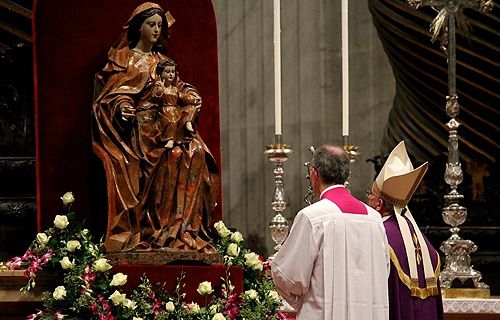On the feast of the Assumption of Mary, Pope Francis said that faith is the defining virture of her greatness and that the mysterious way she was taken into heaven is a foreshadowing of what awaits each of us.
"The Gospel also shows us the truest reason for Mary's greatness and her blessedness: it is faith," the Pope told pilgrims gathered in St. Peter's Square for his Aug. 15 Angelus address, marking the Solemnity of the Assumption of Mary.
Faith, he said, "is the heart of Mary's entire story; she knew - and she said it - that throughout history weighs the violence of the overbearing, the pride of the rich, the arrogance of the proud."
Yet she still believed and proclaimed "that God does not leave his children alone, humble and poor, but sustains them with merciful care, casting down the mighty from their thrones, scattering the proud in the conceit of their hearts."
Dogmatically defined in 1950, the assumption of the Virgin Mary's body into heaven is celebrated Aug. 15 every year, and is one of the most important Marian feast days in the Catholic Church.
In his address, Pope Francis turned to the day's Gospel reading from Luke, which recounts Mary's visit to her cousin Elizabeth shortly after conceiving Jesus through the Holy Spirit.
He recalled Elizabeth's greeting to Mary: "Blessed is she who believed that there would be a fulfillment of what was spoken to her by the Lord."
"This is the faith of our mother, this is the faith of Mary!" he said.
Francis pointed to the famous canticle Mary uttered in response, called the "Magnificat," in which she praises God for the marvelous deeds he has done both in her own life and throughout history.
In this prayer Mary expresses her joy, because she is fully aware of what all the great works in her life at that point mean, namely that through her the Lord will accomplish the salvation her people have long been waiting for, the Pope said.
The prayer also shows us the full meaning of Mary's life, he added, explaining that "if the mercy of the Lord is the engine of her story (then) she who bore the Lord of life (could not be touched by) the corruption of the tomb."
Francis continued, saying that the message of Mary's assumption isn't limited to just her life, but serves as a reminder for each person of what is to come.
"The great things done in (Mary) by the Omnipotent One touch us deeply, they speak to us of our journey in life, they remind us of the end that awaits us: the house of the Father."
Because of Mary's assumption into heaven, we see that life "is not a senseless wandering, but a pilgrimage which, with all of the sufferings and uncertainties, has a sure destination" where the Father awaits us with love, he said.
However, until that destination is reached, God has given his people a sign of consolation and hope for the journey, the Pope said.
And that sign "has a face and a name: the luminous face of the Mother of God, the holy name of Mary, full of grace, blessed because she believed in the word of the Lord."
Each member of the Church is also destined to share in the glory of Mary, their mother, because we also believe in Jesus' sacrifice on the cross and, through baptism, have entered into the mystery of salvation, Francis said.
The Pope concluded by asking for Mary's intercession, so that "while winding our way on this earth, she turn her merciful eyes upon us."
After leading pilgrims in the traditional Marian prayer, Pope Francis turned his thoughts to all those affected by Wednesday's chemical explosions in Tianjin, China.
Tearing through an industrial area where toxic chemicals and gas had been stored, the Aug. 12 explosions were large enough to be picked up by space satellites, and have so far left 85 dead and more than 700 injured, according to reports.
"I assure my prayers for those who have lost their lives, and for all those suffering from this disaster; may the Lord give relief to them and support those committed to alleviating their suffering."

